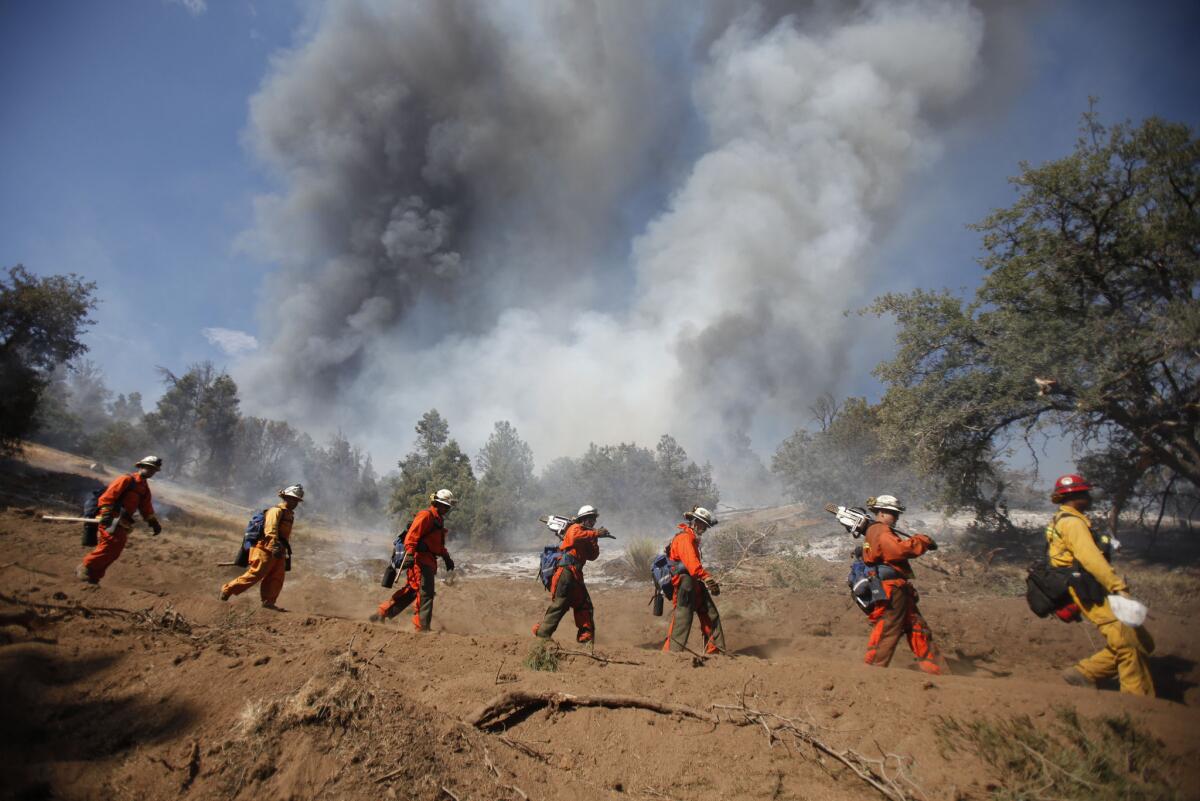Editorial: Inmates risking their lives to fight California’s wildfires deserve a chance at full-time jobs

- Share via
As California continues to burn, the state’s firefighters have spent day after day in the searing heat and ferocious wind, hiking toward the flames, cutting fire lines and protecting homes. It’s grueling, heroic work that saves lives and prevents more devastation. And sometimes, it’s done by prison inmates.
Among the thousands of federal, state and local firefighters on the fire lines, there are also more than 2,500 prisoners who volunteer and train to serve on fire crews. But while these men and women may work alongside professional firefighters now, once they get out of prison, their criminal record will make it virtually impossible for them to get hired as city or county firefighters.
The reason? California makes it extremely difficult, if not impossible, for an inmate firefighter to get the emergency medical technician license needed to become a city or county firefighter. As a result, all that training and expertise the inmates gain while incarcerated can’t help them land a job in their hometown fire department.
That is absurd. California’s prison system doesn’t have an abundance of successful job training and rehabilitation programs for inmates. The prisoner fire crews are a rare exception. The state spends heavily on training and supervision for inmates who work in life-and-death situations. It’s foolish to allow blanket restrictions on professional licensing to prevent them using those skills after they are released.
California has about 3,700 inmates working at minimum security training facilities called “fire camps” throughout the state, 2,600 of whom are qualified to fight on the fire lines, according to the California Department of Corrections and Rehabilitation. The inmate crews receive the same training as the state’s seasonal firefighters and do much of the same work, though their pay — between $2 and $5 a day, plus $1 per hour when they’re on a fire — is considerably less.
Still, there are tangible benefits for the inmates. The jobs are only open to prisoners whose good behavior behind bars qualifies them for the least restrictive incarceration. The work gets them out from behind the prison walls. They earn some money, feel a sense of purpose and can get time off their sentences.
They also learn skills and gain experience for an occupation — if they can find a job as a firefighter.
Once released from prison, the men and women can apply for entry-level jobs with the California Department of Forestry and Fire Protection. Those tend to be temporary seasonal positions in rural areas, often far from their families and the support necessary for successful reentry. Those types of jobs don’t typically require an EMT certification, which is necessary to be hired by most municipal fire departments.
State law directs local emergency services agencies to deny EMT certification to any applicant who has been convicted of two or more felonies, is on parole or probation, or has committed any kind of felony within the past 10 years. So the conviction that got someone into prison and onto a inmate fire crew becomes the disqualification from getting a good, full-time job fighting fires outside of prison.
We already know that lifelong stigmatization of ex-offenders has serious, negative effects. The perpetual stain of a criminal record makes it harder for them to rent an apartment, get a job, earn a professional license, enter a university or even participate in their children’s school activities. That marginalization is a serious impediment to felons reintegrating into and becoming productive members of the community.
For several years, state lawmakers have considered various bills to change the law so that inmate firefighters aren’t disqualified by their criminal records. The most recent version, AB 1211 by Assemblywoman Eloise Reyes (D-San Bernardino), was shelved early in the session after pushback from firefighters associations. The bill will be taken up again next year.
Opponents argue that firefighters enter homes and deal with Californians at their most vulnerable moments, so it’s too risky to hire anyone with a criminal record. The blanket ban on EMT certifications assumes that no felon can be rehabilitated, which is just not true. But AB 1211 wouldn’t bar agencies from considering an applicant’s criminal record. It would end the practice that prevents many former inmate firefighters from even getting a chance to show that they are trustworthy.
After all, inmate firefighters have demonstrated that they can fight wildfires. They should get a shot to prove that they can continue to serve Californians.
More to Read
A cure for the common opinion
Get thought-provoking perspectives with our weekly newsletter.
You may occasionally receive promotional content from the Los Angeles Times.










